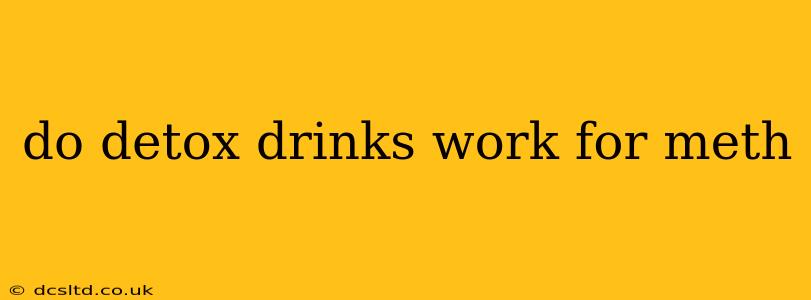Do Detox Drinks Work for Meth? Separating Fact from Fiction
Methamphetamine, a highly addictive stimulant, wreaks havoc on the body. The intense cravings and withdrawal symptoms that follow cessation can be incredibly challenging, leading many to explore methods for faster detoxification. One such method often touted is the use of detox drinks. But do they actually work for meth? The short answer is: no, detox drinks are not effective for eliminating methamphetamine from your system. While they might temporarily mask some symptoms, they don't address the core issue of addiction or the physiological effects of the drug.
This article will delve into the realities of meth detox, explaining why detox drinks fail and outlining safer, more effective approaches.
What are Detox Drinks Marketed for Methamphetamine Detoxification?
These drinks typically contain a blend of diuretics, herbal extracts, and other ingredients purported to flush toxins from the body. Manufacturers often market these products as a quick fix for cleansing the system of drugs, including methamphetamine. However, these claims are largely misleading and lack scientific backing.
How Does Methamphetamine Affect the Body?
Methamphetamine is a powerful stimulant that affects the central nervous system. It increases dopamine levels, leading to feelings of euphoria and increased energy. However, prolonged use leads to significant physical and psychological consequences, including:
- Cardiovascular issues: Increased heart rate and blood pressure, potentially leading to heart attack or stroke.
- Neurological damage: Methamphetamine can damage brain cells, leading to cognitive impairment, memory loss, and mood disorders.
- Dental problems: "Meth mouth" is a common consequence, characterized by severe tooth decay and gum disease.
- Mental health problems: Increased risk of psychosis, anxiety, and depression.
Why Detox Drinks Don't Work for Methamphetamine Detoxification
Detox drinks primarily work as diuretics, increasing urine production. While this can temporarily increase the rate of excretion of some substances, it is ineffective against methamphetamine for several reasons:
- Methamphetamine's Metabolism: Methamphetamine is metabolized by the liver and excreted through urine and feces over an extended period. A detox drink cannot accelerate this process significantly.
- Deep Tissue Accumulation: Methamphetamine can accumulate in fatty tissues, making complete elimination difficult. A simple diuretic won't reach these deposits.
- Addressing Addiction: Detoxification is only the first step in overcoming methamphetamine addiction. It doesn't address the underlying psychological dependence and cravings, which require professional help.
What Are the Real Risks of Using Detox Drinks?
While detox drinks are often marketed as harmless, they can pose risks, including:
- Dehydration: Excessive diuresis can lead to dehydration, which can have serious health consequences.
- Electrolyte imbalance: Loss of electrolytes due to dehydration can cause muscle cramps, weakness, and heart rhythm abnormalities.
- Kidney damage: Overuse of diuretics can strain the kidneys and potentially lead to long-term damage.
- False sense of security: Relying on detox drinks might delay seeking necessary professional medical help, potentially worsening the situation.
What are Safe and Effective Ways to Detox from Methamphetamine?
Safe and effective methamphetamine detoxification requires professional medical supervision. This usually involves:
- Medical detox: A medically supervised program that monitors vital signs, manages withdrawal symptoms, and provides medications to alleviate discomfort.
- Therapy: Individual and group therapy to address underlying psychological issues and develop coping mechanisms to avoid relapse.
- Medication-assisted treatment (MAT): Certain medications can help manage cravings and reduce the risk of relapse.
- Support groups: Connecting with others facing similar challenges can provide crucial emotional support and accountability.
What Should I Do If I Need Help Detoxing from Meth?
If you or someone you know is struggling with methamphetamine addiction, seek professional help immediately. Don't rely on unproven methods like detox drinks. Contact a medical professional, a local addiction treatment center, or a helpline for guidance and support. Early intervention is crucial for successful recovery.
Disclaimer: This information is for educational purposes only and does not constitute medical advice. Always consult with a qualified healthcare professional before making any decisions related to your health or treatment.
